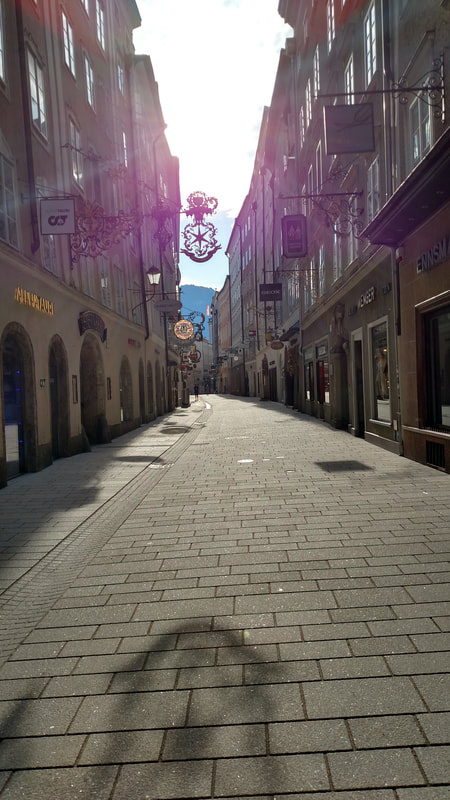On our last full day in Salzburg, a Sunday, we visited the Mozart Residence, the place where he spent his formative years. We went early in the morning and just as we were walking out, the bells from a nearby church began to ring. Standing in this square, I was struck by the thought: Mozart himself probably heard these same bells. I like to at least think they were the exact same bells, but certainly he heard some very similar from the exact same church building. And quite possibly they were rung the exact same way in his day as that day I heard them: by a rope pulled by a church employee.
Given how much the world has changed in the 200+ years since Mozart lived there, it was quite a wondrous realization that such a sound could connect myself to such a famous figure. That moment, and that thought, have inspired me since, especially as I explore traditional repertoire again. This music, truly ‘classical’ music connects figures through time in the same way these bells did. In performing the music of Mozart, I have a direct connection to the artistic passions of a man who lived hundreds of years before, who history has decided to remember. But I’m also connected to people who have played this music since. Great artists who have turned simple notes on a page into beautiful, magical art in sound. The excitement one feels sharing a passion with a friend is amplified when you get to share it with a host of people through time. I’ve been finding this concept inspiring, but also humbling. This music has survived for so many generations for good reason, and I must try to do it justice. There is a certain amount of social capital involved by joining the tradition of performing classical music. So many beautiful artistic ideas have been cultivated with these scores and I have a responsibility to do justice to this artistry. But the time which it has survived through is also present when I play it. These bells I heard in Salzburg rang during war, and were heard by all sorts of figures and events that history would rather forget. The music of Mozart has been played and enjoyed by contemptable people as well. The responsibility of playing this music and accepting the history it has is not just a matter of artistry, but also of reconciliation, of a wish to do good in and for the world. This is one aspect of studying and performing music which contemporary works cannot share in. Non-canonical repertoire simply does not have the accrued temporal history to carry such baggage, both good and bad. As I stated in my previous posts, this is precisely what I was looking for in pursuing the study of contemporary music. But I don’t know a person who doesn’t have some curiosity to understand history. The classical canon gives performers the opportunity to connect through time with sound to history, to worlds long forgotten, and to try and change the world we live in. |
"Modern performers seem to regard their performances as texts rather than acts, and to prepare for them with the same goal as present-day textual editors: to clear away accretions. Not that this is not a laudable and necessary step; but what is an ultimate step for an editor should be only a first step for a performer, as the very temporal relationship between the functions of editing and performing already suggests." -Richard Taruskin, Text and Act Archives
March 2021
Categories
All
|

 RSS Feed
RSS Feed
